Tel: 0129-4001010 Phone: +91 730 321 5033
Email: cs@absoluteveritas.com
BIS Certification for Furniture in India: Process, QCO, Standards & Benefits
Table of Content

The Government of India has made BIS certification mandatory for furniture products through the Furniture Quality Control Order (QCO), 2023, issued by the Department for Promotion of Industry and Internal Trade (DPIIT) under the Ministry of Commerce and Industry. This regulation aims to ensure that furniture sold in the Indian market meets prescribed safety, strength, durability, and quality benchmarks as defined by the Bureau of Indian Standards (BIS).
As per the Furniture QCO, manufacturers and importers—both domestic and foreign must obtain BIS certification and use the ISI Mark before selling covered furniture products in India. The order will be implemented from 13th February 2026, making compliance a critical and time-sensitive requirement for businesses operating in the furniture sector.
The Furniture Quality Control Order, 2023 applies to a wide range of furniture categories, including work chairs, general-purpose chairs and stools, tables and desks, storage units, beds, and bunk beds, each governed by specific Indian Standards (IS). Non-compliance with the QCO may result in legal penalties, market restrictions, and product withdrawal, making early certification essential.
Why Is BIS Certification for Furniture Important?
BIS (Bureau of Indian Standards) certification ensures that your furniture meets safety, quality, and performance standards. It helps manufacturers improve product reliability, build consumer trust, and comply with India’s regulatory requirements. Additionally, BIS certification gives your brand a competitive advantage by demonstrating quality assurance.
The Quality Control Order (QCO) is a government initiative aimed at ensuring product compliance with Indian safety and quality standards. Issued by the Ministry of Commerce and Industry through the Department for Promotion of Industry and Internal Trade (DPIIT), the Furniture Quality Control Order, 2023, mandates that all furniture products must obtain BIS certification before being sold in India.
BIS Certification Compliance for Furniture
With the enforcement of the Furniture Quality Control Order (QCO), 2023 / 2025, issued by the Ministry of Commerce and Industry, BIS certification has become mandatory for furniture manufacturers and importers operating in the Indian market. The QCO mandates that covered furniture goods and articles must conform to the applicable Indian Standards (IS) and bear the BIS Standard Mark (ISI Mark) before they can be sold, distributed, or imported into India.
As per the notification, the Furniture QCO will come into effect 12 months from the date of its official publication, with 13 February 2026 identified as the implementation date. From this date onward, compliance with BIS requirements will be compulsory for all regulated furniture categories.
Under the QCO framework, manufacturers are required to obtain a BIS license under Scheme I of Schedule II of the Bureau of Indian Standards (Conformity Assessment) Regulations, 2018. This involves product testing at BIS-recognized laboratories, factory inspection, and ongoing compliance with quality control norms prescribed by BIS.
Products Covered By The QCO For Furniture
The Quality Control Order (QCO) applies to the following furniture categories, each adhering to its respective Indian Standards (IS):
|
Goods or articles |
Indian Standard |
Title of Indian Standard |
|
(1) |
(2) |
(3) |
|
Furniture |
17631:2022 |
|
|
17632:2022 |
||
|
17633:2022 |
||
|
17634:2022 |
||
|
17635:2022 |
||
|
17636:2022 |
Product Details
How To Get BIS Certification For Furniture Products In India? Furniture Quality Control Order | AV, BIS ISI Mark Certification Process | Get BIS Certificate ISI Mark on Your Product, Furniture Quality Control Order, ISI Mark Certification Process, What is ISI Mark With Full Information?, How To Get BIS ISI Certification in India?, FMCS Certification, BIS ISI For Foreign Manufacturers, Products Requiring BIS ISI Certification, Foreign Manufacturers Certification Scheme, Bureau of Indian Standards, BIS Certification For Foreign Manufacturers.
IS 17631:2022 WORK CHAIRS
This standard defines the performance and safety requirements for work chairs, focusing on strength, stability, and durability. It applies to both fully assembled and ready-to-assemble units, with tests evaluating functionality, material strength, and potential misuse. The specifications cover work chairs designed for adults and assess surface quality, load capacity, and durability under normal and expected usage conditions. However, it does not cover work chairs used in industrial settings different from office environments.
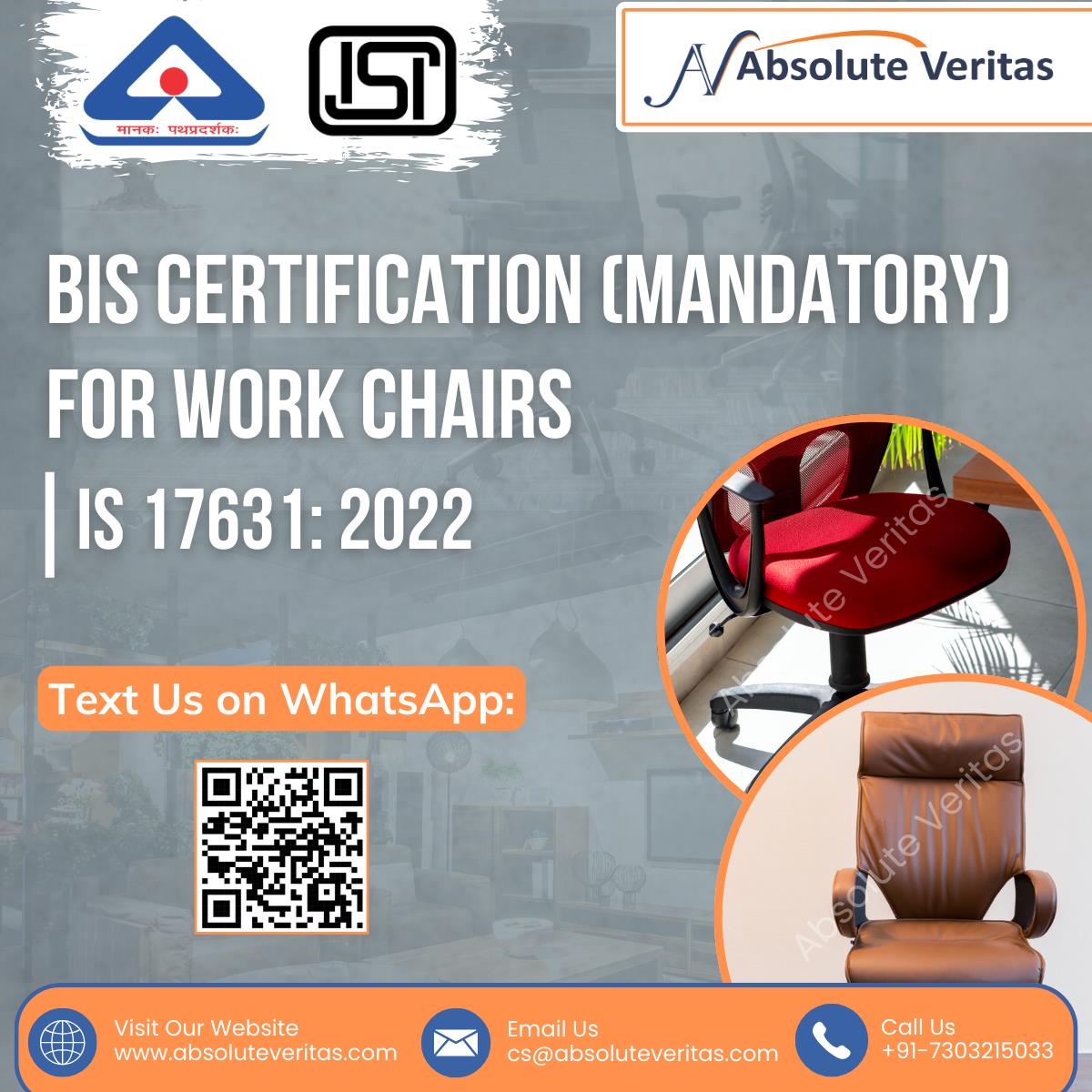
IS 17632:2022 GENERAL PURPOSE CHAIRS AND STOOLS
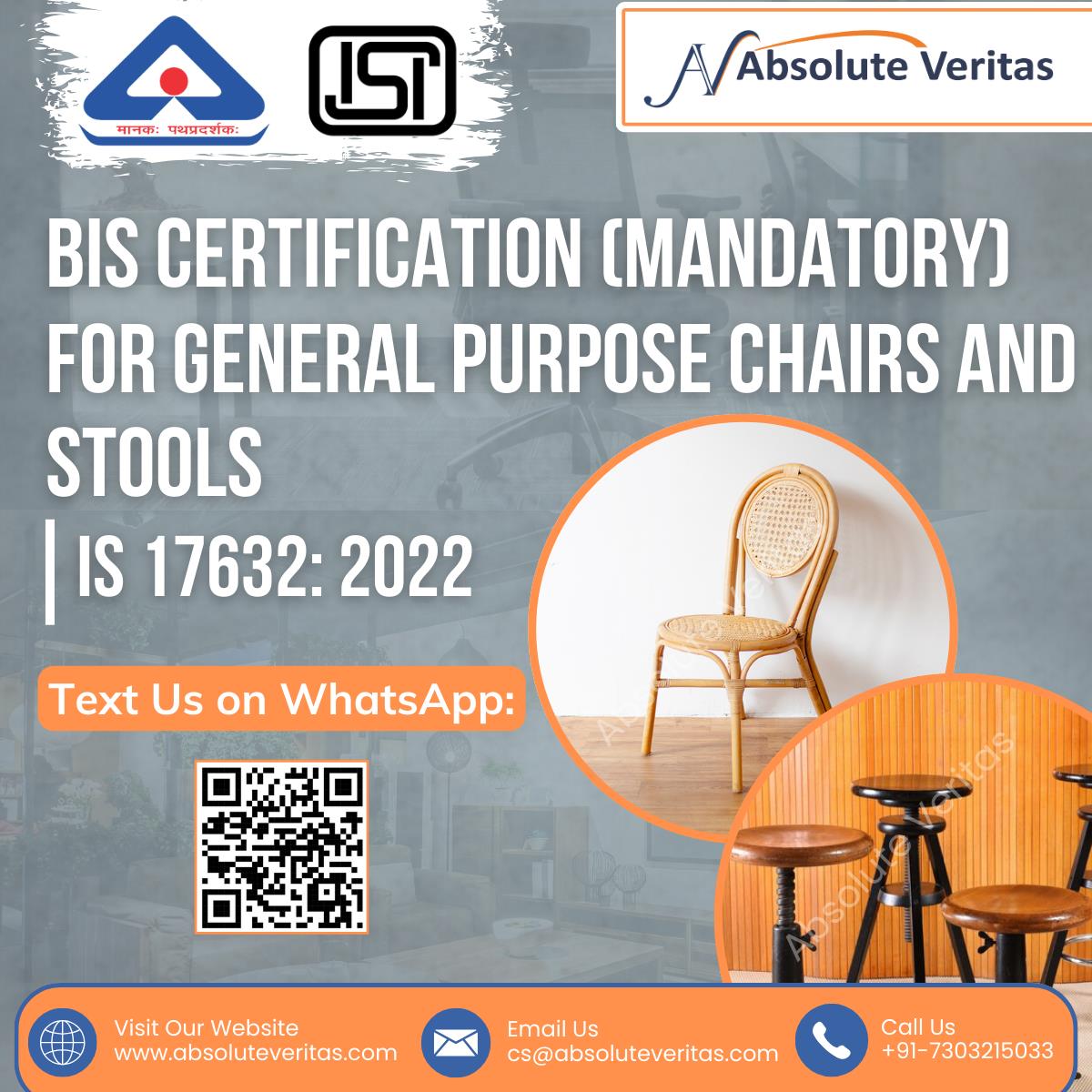
This standard outlines performance and safety requirements for general-purpose chairs and stools, ensuring strength, stability, and durability. It applies to both fully assembled and ready-to-assemble units but excludes reclining chairs, tilting chairs, settees, rocking chairs, and work chairs with swivel bases or castors (covered under IS 17631:2021). Pouffes are classified as stools under this standard. It does not assess ageing, stuffing materials, upholstery fabrics, or foam cushion durability. The specifications apply to chairs and stools designed for adult use.
IS 17633:2022 – Tables and Desks
This standard specifies performance and safety criteria for tables and desks used in seated, sit-stand, or standing positions. It applies to fully assembled and ready-to-assemble units, including those incorporating glass. The tests evaluate structural integrity under normal use and potential misuse for both office and domestic settings. However, the standard does not cover storage elements, ageing effects, or long-term structural failure due to habitual misuse.
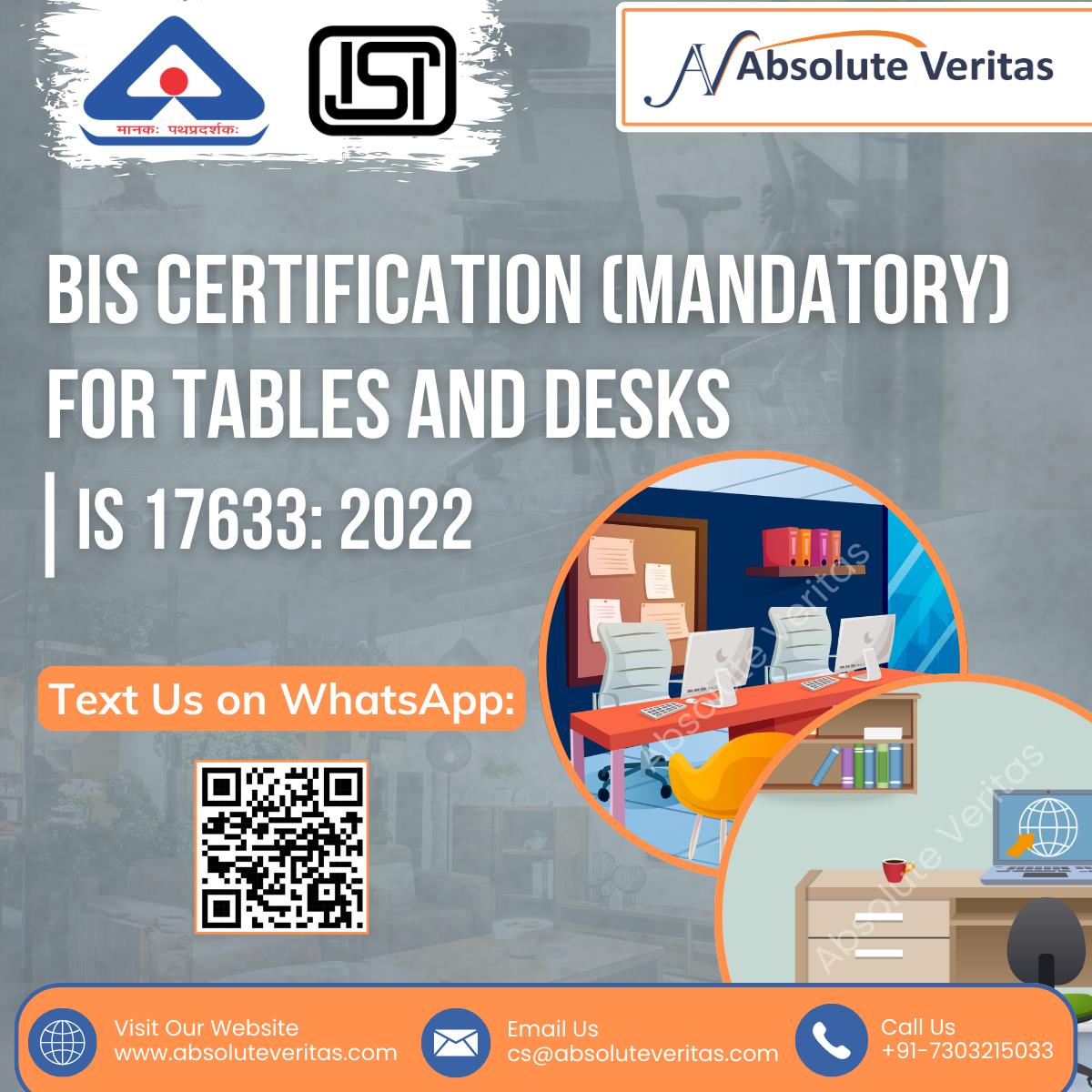
Also Read: BIS QCO for the Furniture (Tables and desks)
IS 17634:2022 – Storage Units
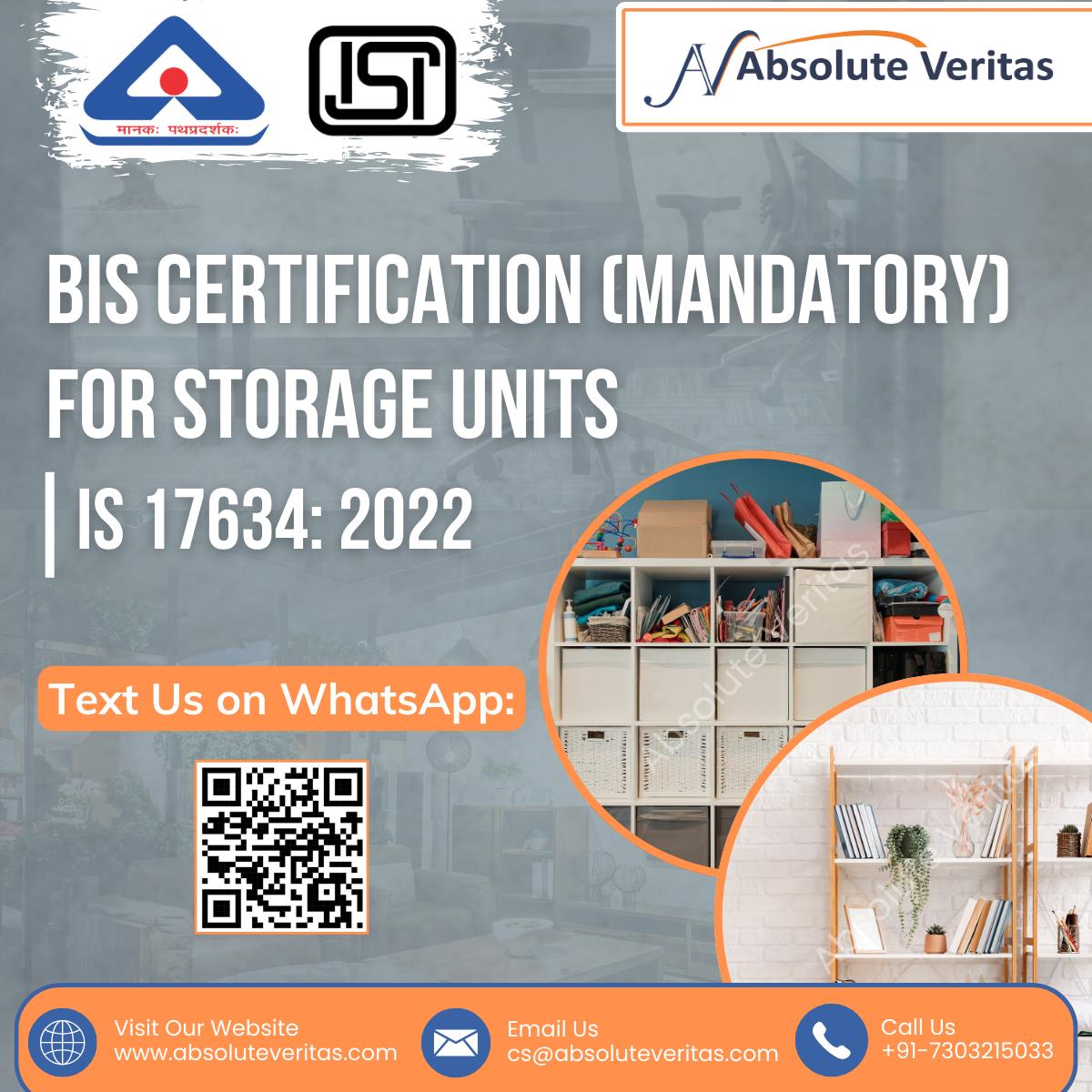
This standard defines strength, stability, and durability requirements for storage units, including movable and non-movable parts for domestic and institutional use. It applies to fully assembled and ready-to-assemble units. Testing involves applying loads, forces, and velocities to simulate real-world use and potential misuse. If a product line includes multiple models, the worst-case scenario must be tested. The standard does not evaluate building structures, meaning wall strength for mounted cabinets is not included—only the cabinet and its mounting components are tested.
Also Read: BIS QCO for the Furniture (Storage units)
IS 17635:2022 – Beds
This standard outlines performance and safety requirements for adult beds used in both domestic and non-domestic settings. It applies to fully manufactured and ready-to-assemble beds but excludes waterbeds, airbeds, foldaway beds, bunk beds, and beds for special needs or medical purposes. The standard does not cover ageing, degradation, fire resistance, or electrical functions. Additional features like electrical adjustability or sofa-to-bed conversion are also outside its scope.
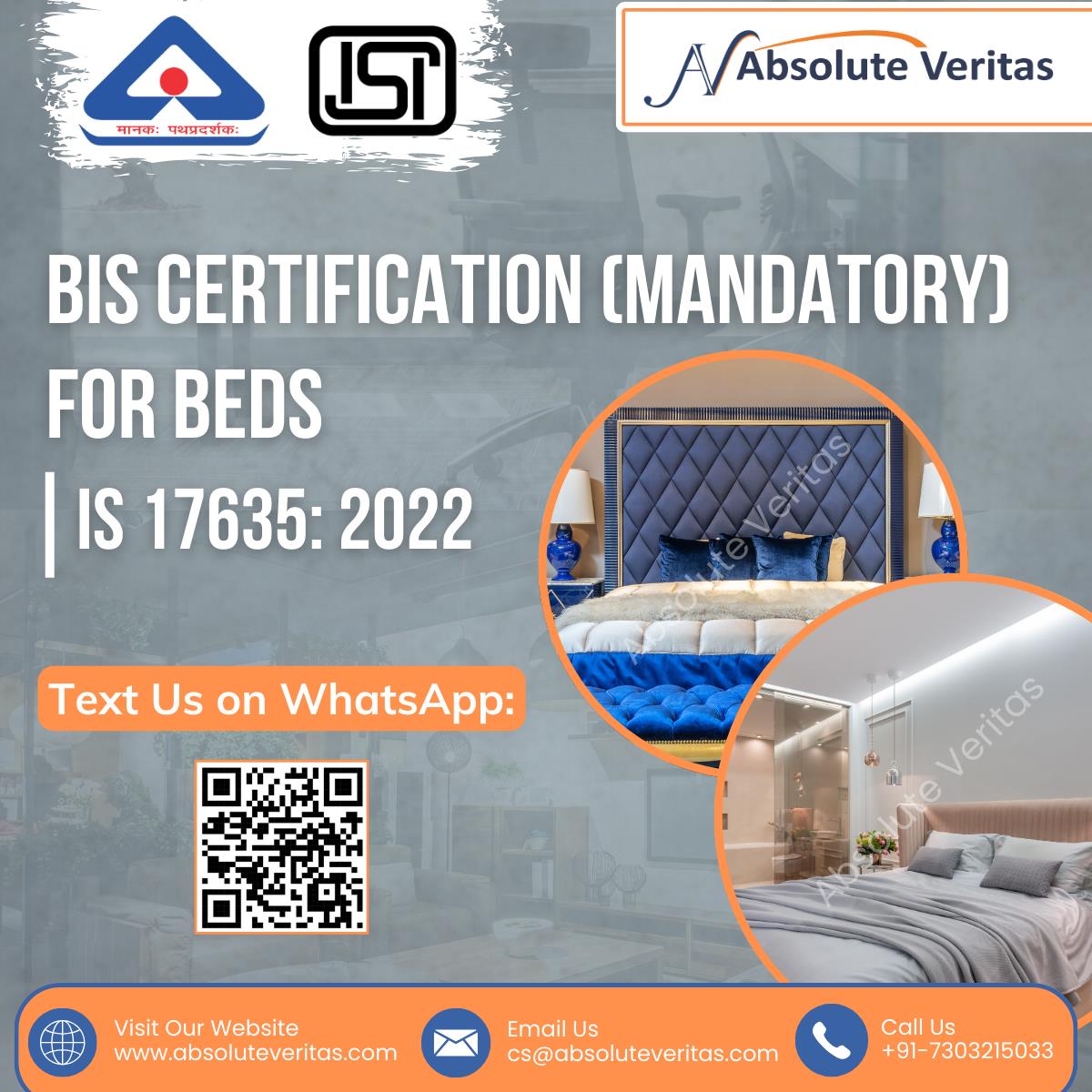
Also Read: BIS QCO for the Furniture (Beds)
IS 17636:2022 – Bunk Beds
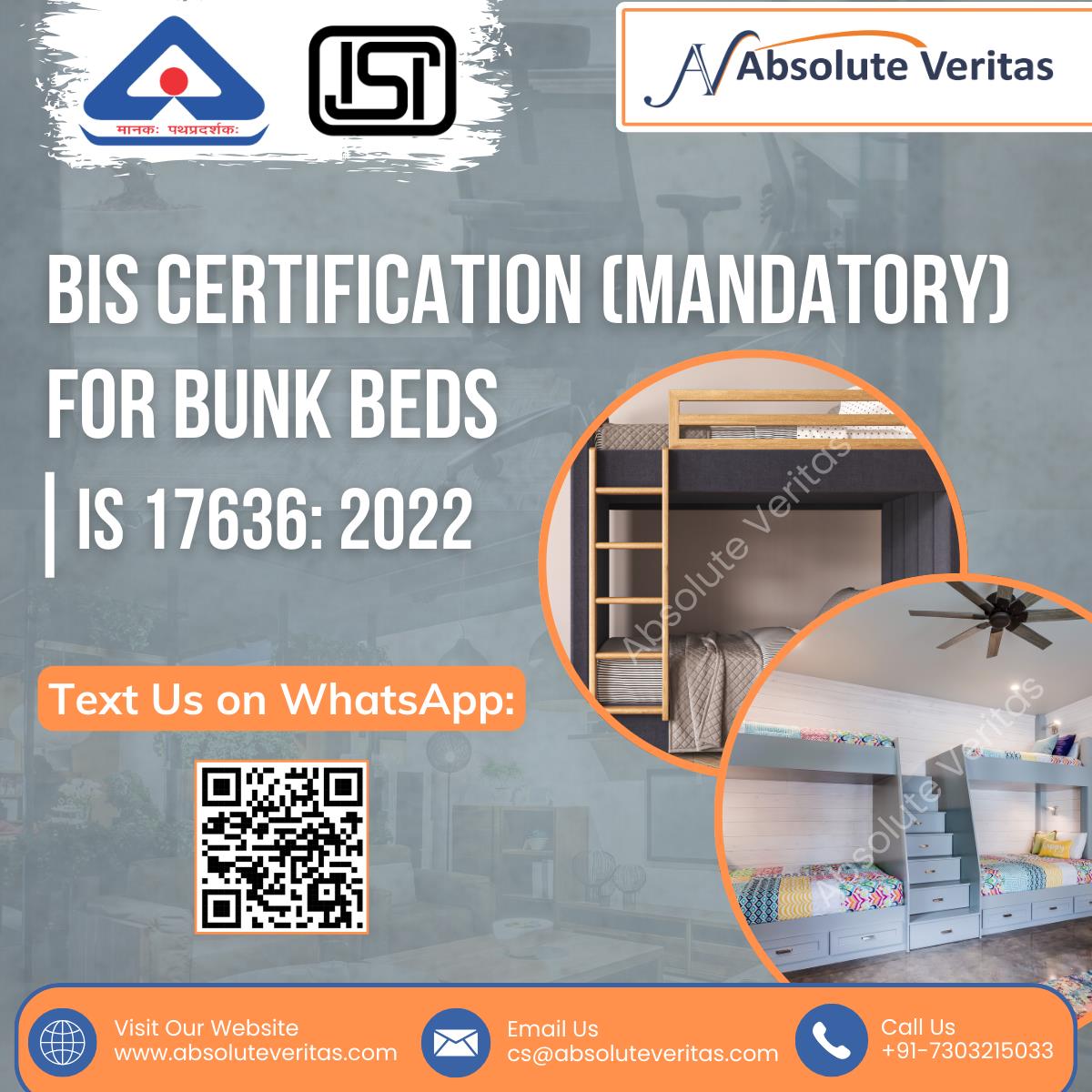
This standard sets safety and performance criteria for bunk beds used in domestic and non-domestic settings. It also applies to single beds with a base height of 800 mm or more above floor level. The requirements cover fully assembled and ready-to-assemble units, assessing load-bearing capacity, stability, and misuse scenarios. Testing focuses solely on sleeping functionality, without considering material composition, design, or manufacturing methods.
Also Read: BIS QCO for the Furniture (Bunk beds)
Process to Obtain BIS Certification for Furniture
Obtaining BIS certification for furniture involves a systematic conformity assessment process designed to ensure that products comply with the applicable Indian Standards (IS) notified under the Furniture Quality Control Order (QCO). The certification process applies to both domestic manufacturers in India and foreign manufacturers exporting furniture products to India, with specific procedural requirements for each.
Before initiating the application, manufacturers must identify the applicable Indian Standard for their furniture product category and ensure compliance with all technical and safety requirements. The process includes product testing, documentation verification, factory inspection, and license approval by the Bureau of Indian Standards (BIS).
Steps to Obtain BIS Certification for Furniture:
-
Identify Relevant Standards for the furniture product.
-
Prepare Required Documents for certification.
-
Submit the Application via the BIS online portal.
-
Document Review by BIS authorities.
-
Product Testing at a BIS-approved laboratory.
-
On-Site Audit of the manufacturing facility by a BIS officer.
-
License Approval upon successful verification.
About Absolute Veritas
Absolute Veritas is a trusted BIS certification and regulatory compliance consultancy, assisting both Indian and foreign manufacturers in successfully navigating India’s mandatory product certification landscape. With proven expertise in BIS FMCS (Foreign Manufacturers Certification Scheme) and ISI Mark certification, we help manufacturers achieve seamless market entry into India while ensuring full compliance with applicable Indian Standards and Quality Control Orders (QCOs).
Our end-to-end consultancy services cover application filing, factory audit coordination, product testing, documentation, and post-certification support, enabling manufacturers to minimize delays and avoid regulatory hurdles. Absolute Veritas has played a pivotal role in landmark BIS certifications and foreign audits, demonstrating our deep technical understanding of BIS procedures and evolving compliance requirements.
By combining regulatory expertise, industry insight, and a client-centric approach, Absolute Veritas serves as a reliable compliance partner for manufacturers seeking timely BIS licenses, ISI marking, and long-term regulatory assurance in the Indian market.
Connect withAbsolute Veritas for expert guidance, faster approvals, and complete regulatory support.
For any questions regarding the most recent update on BIS ISI Mark registration licenses, please reach out to us via email at cs@absoluteveritas.com
Frequently asked questions (FAQ)
Is BIS certification mandatory for furniture in India?
Yes, BIS certification for furniture becomes mandatory when the product is notified under a Quality Control Order (QCO) by the Government of India. Once enforced, manufacturers and importers must obtain BIS certification before selling furniture in India.
Under which scheme is BIS certification granted for furniture?
BIS certification for furniture is granted under two schemes: the ISI Certification Scheme for Indian manufacturers and the Foreign Manufacturers Certification Scheme (FMCS) for foreign manufacturers exporting furniture to India.
Is BIS FMCS certification required for imported furniture?
Yes, imported furniture products covered under BIS QCOs must obtain FMCS certification before import and sale in India. Without FMCS approval, customs clearance and market access are restricted.
Who needs FMCS certification for furniture?
Any foreign manufacturer producing furniture outside India and intending to export or sell those products in the Indian market must obtain FMCS certification if the product falls under mandatory BIS norms.

 LinkedIn
LinkedIn  WhatsApp
WhatsApp  Facebook
Facebook 





 ❮
❮
